IPE Annual report 2012 - Health Sciences - Curtin University
IPE Annual report 2012 - Health Sciences - Curtin University
IPE Annual report 2012 - Health Sciences - Curtin University
Create successful ePaper yourself
Turn your PDF publications into a flip-book with our unique Google optimized e-Paper software.
Foundations of<br />
Medical Science<br />
191 (Discipline unit)<br />
Foundations of<br />
Medical Practice<br />
192 (Discipline unit)<br />
PBL<br />
Development<br />
Practical <strong>IPE</strong><br />
Collaboration<br />
Planned manual handling practice with physiotherapy students. Tutorial role play utilising <strong>IPE</strong> videos<br />
about hazards for the elderly living at home. Partnership to Heal case study (<strong>IPE</strong> online where students<br />
choose-their-own ending scenarios). <strong>IPE</strong> placement with pharmacy students. Emergency department<br />
placement examining the roles of various professions (nursing, paramedics)<br />
Syllabus includes the “role of communication in interprofessional practice/ effective collaborative practice”<br />
Learning outcomes include “Demonstrate effective communication skills with clients and health<br />
professionals in an interprofessional clinical setting<br />
Problem 1, Year 2 – vehicle crash theme that highlights handover from ambulance staff to an<br />
interprofessional health care team in the hospital. Also, <strong>IPE</strong> implications at conclusion of problem,<br />
relating to ongoing rehabilitation, counselling, etc.<br />
Year 2 & 3 – co-locate medical students with other students on placement (e.g. –Year 2 Semester 1<br />
students with pharmacy/laboratory medicine students; Year 2 Semester 2 with various health<br />
professional students). Further case based learning in the online Stilwell virtual community<br />
Table 5. Medical curriculum <strong>IPE</strong> overview.<br />
3.5 Staff Professional Development<br />
Professional development for both university and industry staff was once again an important undertaking for the <strong>IPE</strong> team in<br />
<strong>2012</strong>. Workshops on facilitating interprofessional education in education settings (classroom and online) and workshops specific<br />
to practice settings were delivered to staff in both semesters one and two. A three-hour workshop in February was attended by 26<br />
staff new to teaching in Y1 core units. This session provided an overview of the curriculum and information on interprofessional<br />
facilitation and team teaching. Participants were asked to rate their Motivation, Knowledge, and Confidence related to<br />
interprofessional team teaching on a 5 point Likert scale from ‘very low’ to ‘very high’. A positive trend in all ratings<br />
was found from pre- to post- workshop (Table 6). Participants highlighted that the modelling of team teaching by the<br />
facilitators was very helpful, as was the opportunity to learn from other people’s experiences and network with<br />
colleagues and being motivated by others’ enthusiasm. Participants also indicated that the practical activities and<br />
strategies discussed were helpful and indicated that they would like more information on practical strategies,<br />
particularly strategies to use to help engage and motivate students. There appears to be a need for strategies to<br />
provide ongoing support for facilitators, such as follow up workshops and debriefing sessions as well as possibly a<br />
more formalised peer-feedback process.<br />
PRE<br />
POST<br />
Very<br />
High<br />
High Av Low Very<br />
Low<br />
Very<br />
High<br />
High Av Low Very<br />
Low<br />
Motivation to engage in team teaching 45% 50% 5% - - 44% 50% 6% - -<br />
Confidence to engage in team teaching 50% 40% 35% - - 33% 56% 11% - -<br />
Knowledge of strategies to facilitate good<br />
team teaching<br />
Confidence in ability to model collaborative<br />
practice (Interprofessional practice)*<br />
11% 30% 55% 10% - 22% 67% 11% - -<br />
15% 50% 30% 5% - 28% 67% 6% - -<br />
Table 6. <strong>2012</strong> Interprofessional First Year Staff Workshop Quantitative Evaluation Results (N = 20 pre & 18 post).<br />
Staff from across the state involved in the various <strong>IPE</strong> placement activities participated in the semester 1 workshops. The three<br />
workshops held in semester two consisted of two different target audiences – staff involved in <strong>Curtin</strong>’s <strong>IPE</strong> placement activities<br />
and then staff from WA Country <strong>Health</strong> Service. Staff were asked to rate their own levels of motivation and confidence to facilitate<br />
<strong>IPE</strong> as well as their knowledge of strategies to do this. Finally, they were asked to rate their ability to model effective<br />
interprofessional practice (IPP). The results shown in Table 7 demonstrate the effectiveness of the workshop in increasing staff<br />
self-ratings.<br />
PRE<br />
POST<br />
Very<br />
High<br />
High Av Low Very<br />
Low<br />
Very<br />
High<br />
Table 7. <strong>2012</strong> Practice based <strong>IPE</strong> staff workshop Quantitative Evaluation Results (N=15)<br />
High Av Low Very<br />
Low<br />
Motivation to engage in team teaching 10 3 1 1 - 9 5 1 - -<br />
Confidence to engage in team teaching 4 8 2 1 - 7 6 2 - -<br />
Knowledge of strategies to facilitate good 2 5 5 5 1 8 5 2 - -<br />
team teaching<br />
Confidence in ability to model collaborative<br />
practice (Interprofessional practice)*<br />
5 7 2 1 - 7 7 1 - -


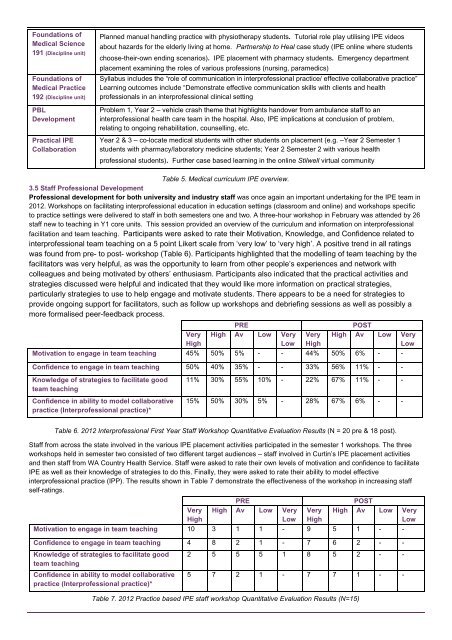
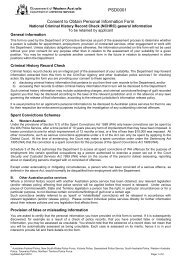
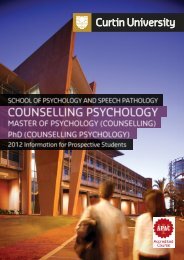
![Mental health commission report July 2010 - June 2011 [.pdf]](https://img.yumpu.com/50755705/1/184x260/mental-health-commission-report-july-2010-june-2011-pdf.jpg?quality=85)
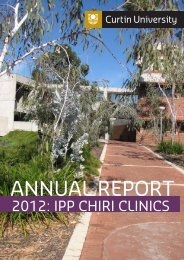
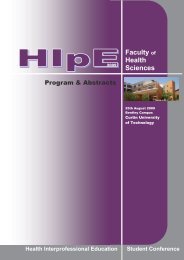
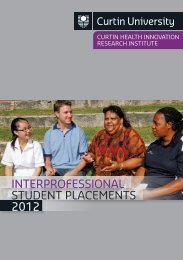
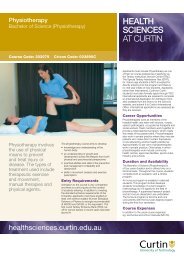
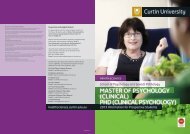
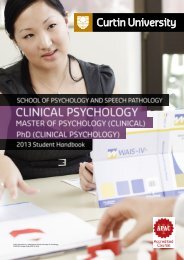

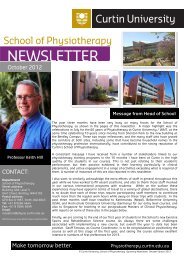
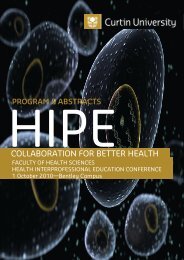

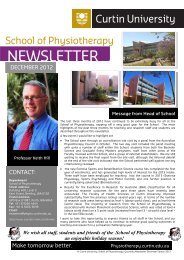
![2007 Annual Report [.pdf] - Health Sciences - Curtin University](https://img.yumpu.com/44476724/1/184x260/2007-annual-report-pdf-health-sciences-curtin-university.jpg?quality=85)